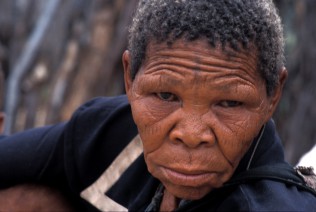An appeals court in Botswana has ruled that indigenous Bushmen can drill wells for water on their traditional land in the Kalahari Game Reserve. After a legal battle of more than a decade, it seems that the Bushmen can finally return to live on their ancestral lands – that is, if the government accepts the ruling.
The situation of southern Africa’s San Bushmen has attracted the attention of international activists and politicians, as evidenced by Survival International’s recent call for a tourism boycott of Botswana. The London-based nongovernmental organization hoped to pressure the Botswana government to recognize the right of the Bushmen to live on their ancestral lands in the Central Kalahari Game Reserve (CKGR). According to U.S. embassy cables from 2005, recently released by Wikileaks, then-U.S. ambassador to Botswana, Joseph Huggins, also condemned the treatment of the San Bushmen, saying they “have been dumped in economically absolutely unviable situations without forethought, and without follow-up support. The lack of imagination displayed on the part of the Government of Botswana is breathtaking.”

The government of Botswana has repeatedly used the Bushmen’s hunting as justification for their eviction. However, as James Workman, who has spent time among the Bushmen and is the author of an award-winning book on the Central Kalahari controversy, Heart of Dryness: How the Last Bushmen Can Help Us Endure the Coming Age of Permanent Drought, points out, wildlife populations in the Kalahari have been rising, not declining. “This is hard to square with the Bushmen as a threat,” Workman says. “In fact, biodiversity is richest around the world where the land tenure and fishing rights of traditional and indigenous cultures has been most protected.” In his book, Workman mentions that diamond mining is a much bigger threat to the preservation of wildlife than hunting, since it takes about 170 gallons of water to extract a single carat of diamonds. At that rate, wildlife will soon be left without drinking water.
Diamond mining, which is the motor of Botswana’s economy, seems to be on its way in the CKGR with the government granting diamond company Gem Diamonds Limited a permit to proceed. This is a controversial decision, since the Bushmen were until recently prohibited from using the water well they have used for many years.
The government of Botswana has claimed that the Bushmen were moved in order to enhance social services for this impoverished group. However, in the leaked US embassy cables, a local NGO representative is recorded saying to ambassador Huggins that the Bushmen “are systematically being discriminated against by the government, which moves them away from wherever there might be an income-generating opportunity.”
The Botswana government is also promoting the Central Kalahari as a tourist destination. The largest tourist operator in the area, Wilderness Safaris, has recently opened an ecolodge. This has prompted Survival International to target the operator, which calls itself a “responsible ecotourism and conservation company,” as part of the organization’s campaign against the Botswana government. Before the news of the ruling was released Tess Thackara of Survival International explained why they put pressure on Wilderness Safaris, while the main blame seemed to lie with the government: “Yes, the government is responsible for pursuing a policy of persecution towards the Bushmen, but as the profiteers of Bushman land Wilderness Safaris is also implicated. It built a luxury lodge on Bushman land without consulting them, and while their guests can enjoy a swimming pool, the Bushmen are not allowed to drink from water boreholes on their own land….Wilderness Safaris knows this to be the case, and yet they continue to maintain a close relationship with Botswana’s government.”
Wilderness Safaris strongly maintains that they have done nothing wrong: “The right to operate an ecotourism camp from this location was acquired in a transparent and public tender process for which submissions were invited by the Botswana Government. After a rigorous assessment process, including an Environmental Impact Assessment we won the tender for the site of Kalahari Plains Camp.” A company press release in response to Survival International’s allegations states that “there is no question of access to land being prevented in any way whatsoever” and that “the acquisition and usage of water at Kalahari Plains Camp is conducted without impact on the Bushmen.” The water they use for the swimming pool “has a salinity level higher than the sea,” making it unsuitable for drinking water.
Chris Roche, the coordinator of Wilderness Safaris’ sustainability team, believes that Survival International is using Wilderness Safaris in an attempt to pressure the government to accede to their terms. “We are an ethical operator with an exemplary track record in engaging with communities and as such Survival sees us as vulnerable through our responsible traveler constituency,” says Roche. “We are a far softer target than the Botswana government.”
Survival International does not deny that it aims to get to the government through Wilderness Safaris: “It must uphold the rights of the Bushmen against the government’s continuous persecution and put pressure on the government to comply with the High Court’s 2006 ruling [in which it ruled that the evictions had been illegal and unconstitutional and that the Bushmen have the right to return to their lands]. It is their legal and moral obligation to do so.”
Survival’s Tess Thackara concludes: “The solution is simple: if the government wants Survival to lift the boycott, all that it has to do is to allow those Bushmen who want to remain in the CKGR the means by which to do so.” The recent legal judgment is one step in the right direction. Time will tell if the government accepts and upholds the ruling.
Read Ethical Traveler's Reprint Policy.
